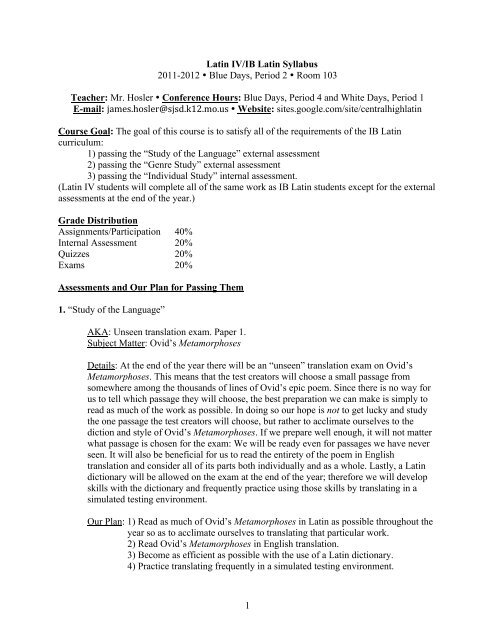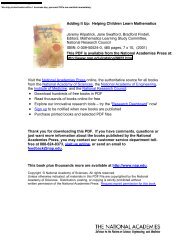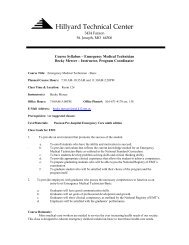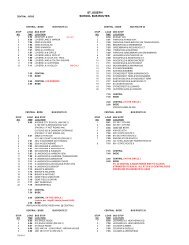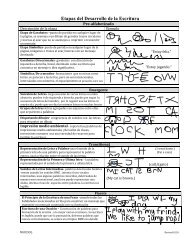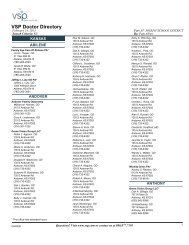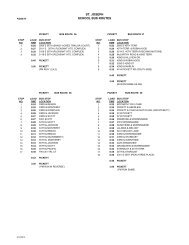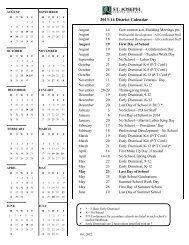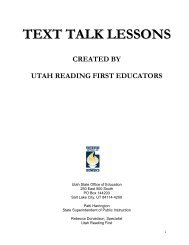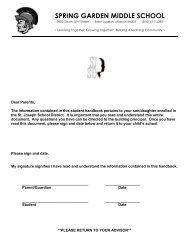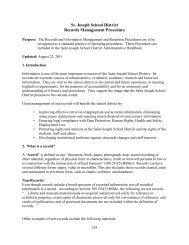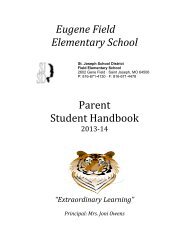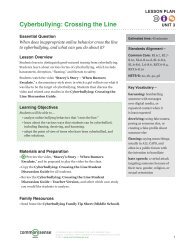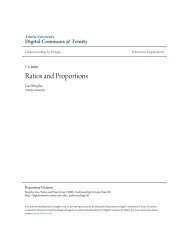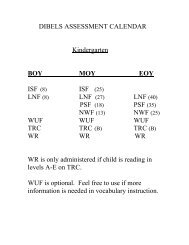1 Latin IV/IB Latin Syllabus 2011-2012 ⢠Blue Days, Period 2 ⢠Room ...
1 Latin IV/IB Latin Syllabus 2011-2012 ⢠Blue Days, Period 2 ⢠Room ...
1 Latin IV/IB Latin Syllabus 2011-2012 ⢠Blue Days, Period 2 ⢠Room ...
You also want an ePaper? Increase the reach of your titles
YUMPU automatically turns print PDFs into web optimized ePapers that Google loves.
<strong>Latin</strong> <strong>IV</strong>/<strong>IB</strong> <strong>Latin</strong> <strong>Syllabus</strong><br />
<strong>2011</strong>-<strong>2012</strong> <strong>Blue</strong> <strong>Days</strong>, <strong>Period</strong> 2 <strong>Room</strong> 103<br />
Teacher: Mr. Hosler Conference Hours: <strong>Blue</strong> <strong>Days</strong>, <strong>Period</strong> 4 and White <strong>Days</strong>, <strong>Period</strong> 1<br />
E-mail: james.hosler@sjsd.k12.mo.us Website: sites.google.com/site/centralhighlatin<br />
Course Goal: The goal of this course is to satisfy all of the requirements of the <strong>IB</strong> <strong>Latin</strong><br />
curriculum:<br />
1) passing the “Study of the Language” external assessment<br />
2) passing the “Genre Study” external assessment<br />
3) passing the “Individual Study” internal assessment.<br />
(<strong>Latin</strong> <strong>IV</strong> students will complete all of the same work as <strong>IB</strong> <strong>Latin</strong> students except for the external<br />
assessments at the end of the year.)<br />
Grade Distribution<br />
Assignments/Participation 40%<br />
Internal Assessment 20%<br />
Quizzes 20%<br />
Exams 20%<br />
Assessments and Our Plan for Passing Them<br />
1. “Study of the Language”<br />
AKA: Unseen translation exam. Paper 1.<br />
Subject Matter: Ovid’s Metamorphoses<br />
Details: At the end of the year there will be an “unseen” translation exam on Ovid’s<br />
Metamorphoses. This means that the test creators will choose a small passage from<br />
somewhere among the thousands of lines of Ovid’s epic poem. Since there is no way for<br />
us to tell which passage they will choose, the best preparation we can make is simply to<br />
read as much of the work as possible. In doing so our hope is not to get lucky and study<br />
the one passage the test creators will choose, but rather to acclimate ourselves to the<br />
diction and style of Ovid’s Metamorphoses. If we prepare well enough, it will not matter<br />
what passage is chosen for the exam: We will be ready even for passages we have never<br />
seen. It will also be beneficial for us to read the entirety of the poem in English<br />
translation and consider all of its parts both individually and as a whole. Lastly, a <strong>Latin</strong><br />
dictionary will be allowed on the exam at the end of the year; therefore we will develop<br />
skills with the dictionary and frequently practice using those skills by translating in a<br />
simulated testing environment.<br />
Our Plan: 1) Read as much of Ovid’s Metamorphoses in <strong>Latin</strong> as possible throughout the<br />
year so as to acclimate ourselves to translating that particular work.<br />
2) Read Ovid’s Metamorphoses in English translation.<br />
3) Become as efficient as possible with the use of a <strong>Latin</strong> dictionary.<br />
4) Practice translating frequently in a simulated testing environment.<br />
<br />
1
2. “Genre Study”<br />
AKA: Seen translation/commentary exam. Paper 2.<br />
Subject Matter: Catullus, poems 1, 4, 10, 12, 14, 42, 46, 70, 75, 87, 96, and 109<br />
AND<br />
Horace, Odes Book 3, poems 1, 9, 15, and 29<br />
AND<br />
Virgil’s Aeneid Book 6, lines 154-476<br />
Details: At the end of the year there will be a “seen” exam involving translation of and<br />
commentary on some passages taken from the above selections of Catullus, Virgil, and<br />
Horace. Since we know what will appear on the exam, the best preparation for us will be<br />
to complete a careful and thorough reading of the selections above. Ultimately, we are<br />
expected to be able to 1) translate the lines they have indicated and 2) answer more<br />
advanced questions concerning Catullus’s, Virgil’s, and Horace’s style and concerning<br />
the content of whatever passages they choose for the exam; therefore we will frequently<br />
practice answering the kinds of questions they will ask in a simulated testing<br />
environment. NOTE: Horace has never once appeared on the exam as the only author to<br />
choose from. For the past many years, one has always been able to ignore Horace on the<br />
exam and choose to do Catullus instead. We will therefore work on Catullus intensively<br />
and will only cover Horace if we move through Catullus quickly enough and there is<br />
extra time toward the end of the year.<br />
Our Plan: 1) To finish a careful, thorough reading of Catullus, poems 1, 4, 10, 12, 14, 42,<br />
46, 70, 75, 87, 96, and 109 and Virgil Aeneid 6: 154-476.<br />
2) Practice frequently in a simulated testing environment.<br />
3) Extra time will be spent preparing for the unlikely appearance of Horace as<br />
a required author on the exam.<br />
3. “Individual Study”<br />
AKA: Project. Internal Assessment.<br />
Type of Project: Research Dossier<br />
Details: Students must complete an individual project. The project must be what is called<br />
a “research dossier,” which is an annotated collection of 10-12 primary sources. The<br />
topic must be related to classical language, history, or civilization and will be chosen by<br />
the student at the beginning of the year. Each annotation, though short, should explain its<br />
source and also tie all of the sources together into a coherent, meaningful whole.<br />
Our Plan: To work on the projects and improve them continually to perfection throughout<br />
the first half of the year. My goal is that projects will be totally complete around the<br />
beginning of the second semester.<br />
<br />
2


